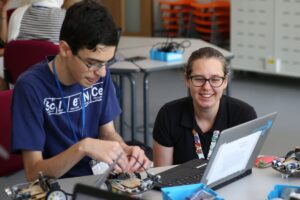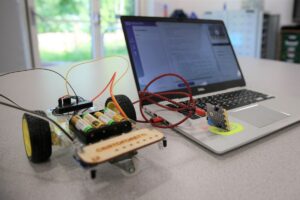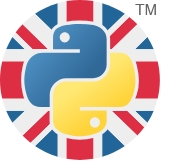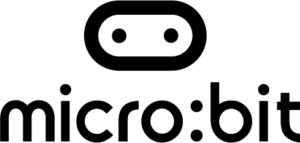9:00 – 9:30am: Arrival
Check-in on arrival, refreshments available
9:30 – 10:00 Introduction
By Science Oxford and Micro:bit Educational Foundation
10:05 – 10:50am: Python in Context
Sophy Palmer & Greg Corbett, Rutherford Appleton Laboratory STFC
Using a bespoke online system, Monty, RAL helps their work experience students learn Python over four sessions and runs subject specific workshops to put programming in context. See this system in action, get some tips for teaching Python to your own students, and see how one scientific organisation makes their particle physics research accessible to school-aged learners.
11:05 – 11:50am: Coding for Climate Action & Sustainable Computing
Digit<all>
Digit<all> is a charity that supports learning digital skills through the lens of contextual approaches such as climate action, sustainability and physical activity. Hear about their work, and find out about their new resources where, with some additions to the micro:bit of £5 or less, you can develop a range of sustainable solutions including solar, wind and power down initiatives.
12:00 – 12:45pm Kids who Code: Changemakers
Allen Tsui
Hear how one London school has established collaborations beyond the playground to feed the future recruitment needs of the Computing and Technology sectors. In this interactive showcase, play with some amazing programmable devices such as Intelino to understand their potential impact on learning.
12:45 – 1:45pm: Lunch with Discussion Groups
1:45 – 2:30pm: Teaching AI
Peter Marshman, British Computing Society
Hear about current research, the developing gap in Artificial Intelligence and AI’s climate implications. Try out some contained AI activities for students, and learn how to make use of both new and existing teaching resources to help students understand how AI works – not just how to use it.
2:40 – 3:25pm: Using the Micro:bit Classroom Tools to Create Games in Python and Engage all Learners
Chris Lovell, Thornton College
Hear from an experienced classroom teacher on using the micro:bit and PRIMM pedagogy to enable all students to make rapid progress in learning how to code in Python. Get practical tips on using the micro:bit classroom’s accessibility tools to support children with special educational needs and see how making computer games can engage all learners.
3:35 – 4:20pm: National Centre for Computing Education Taster
Ben Margetts, Senior PDL, Computing Hub Secondary Lead for Oxfordshire
The National Centre for Computing Education provides new and experienced teachers with support through CPD, curriculum/lesson plans, computing resource loans and lesson plans, and mentoring. Hear more about what the Berks, Bucks & Oxon Hub can do to support you, and experience a taster CPD session, getting some tips for teaching Python to your students.
4:20 – 4:30pm: Wrap-up and departure



